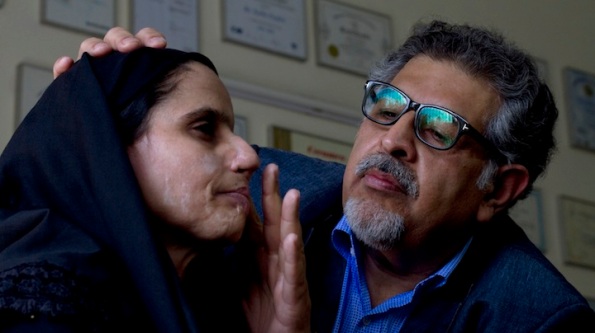Archive
Human Rights Watch Film Festival 2014: Saving Face
By: Addison Wylie
The Human Rights Watch Film Festival has made me exhale an astonished “wow” twice now. That’s a compliment I haven’t admitted to in a while. It’s absolutely true in the case of Daniel Junge and Sharmeen Obaid-Chinoy’s harrowing doc Saving Face.
The mighty film, which deservedly won 2012’s ‘Best Documentary Short’ Oscar, shows audiences how disturbingly frequent and heartbreakingly affective acid crimes are. Every year, numerous Pakistani women are dosed with different forms of acidic attacks. The victims are left wondering what they did to deserve such torture and public humiliation.
Impressively, Junge and Obaid-Chinoy interview the alleged attackers – most of which are the husbands. They give emotionless stories claiming they had nothing to do with the burns, and that they’ve been wrongfully accused. The shiftiness in their testimonials as well as their unsupported proof doesn’t hold water – it’s blatant to see that. The filmmaking duo don’t have an agenda to make all Pakistani men look like monsters. They simply ask questions and let their cameras roll. What they capture are sit downs with these apathetic, terrible contributors to lifelong injury.
The act of acid crimes gets lots of attention from those who want to bring justice. A Londoner plastic surgeon, Dr. Mohammad Jawad, flies to Pakistan to survey the pandemic and offer his assistance to reconstruct facial features. We see in every instance that he’s on screen how he tries to maintain his composure while his feelings of sadness and frustration seep out.
For a film that clocks in at under an hour (Saving Face is 52 minutes), the filmmakers pack a lot of development into the film. Junge and Obaid-Chinoy select individual subjects and open their lives up to us. The women, who embrace the filmmakers’ affection, show us what their living conditions are, take movie goers to the original spot where they were attacked, and explain personal barrenness. Saving Face gives audiences a very intimate and utmost honest view behind the veils and burqas without anything feeling too intrusive.
Because these victims are worried that a similar attack will happen in the near future, audiences are also shown other resources where these women can seek protection. We get an unbarred look at ASF – the Acid Survivors Foundation – and the kind saints who seek a change regarding the consequences the initiators face post-crime.
Saving Face is a powerful, well made and competently justified piece of work. The doc may seem quick, but nothing is ever cut too short. It has an impact in both its emotional connection and its respectful representation that beefier films would be jealous of. Just “wow”.
***********
Catch Saving Face at Toronto’s Human Rights Watch Film Festival on Sunday, March 2 at 3:30 pm at the TIFF Bell Lightbox.
Human Rights Watch Film Festival 2014: In the Shadow of the Sun
By: Addison Wylie
I find myself in a predicament trying to review Harry Freeland’s documentary In the Shadow of the Sun. Prior to the film, I was oblivious to the subject matter and found myself perplexed by the harsh reality that stalks Tanzanian albinos.
In the Shadow of the Sun is a perfectly fine documentary, but I keep feeling as if I’m rating Freeman’s doc on the content represented rather than the film the material resides in. That isn’t the fault of Freeland’s wholehearted filmmaking, however. The subject is just that powerful.
After a rumour circulates claiming that albinos are a rare form of future fortune and wealth, impoverished individuals or those simply seeking a good luck charm set out to retrieve parts of albinos to keep – resulting in nasty slaughters and diminishing hope for those born differently. Besides the grisly tragedies, Tanzanian albinos are viewed as useless people who should be shunned.
You can see how it’d be easy to get sucked into this distressing situation, and shift focus away from the film itself. Fortunately, audiences will still be able to appreciate In the Shadow of the Sun’s picturesque cinematography and the valuable minimalist filmmaking.
It’s important to note that Freeland doesn’t shy away from any details. That description of the doc’s rawness shouldn’t entice you, but instead warn those who are faint of heart. Movie goers will see the lengths others will go through to obtain a piece of “luck”. Although, the uncensored look is helpful, these images are some of the most graphic content I’ve ever seen and will undoubtably make audiences queasy during their sympathizing.
The film’s core centres around Josephat Torner, an outspoken albino who wants to bring awareness to the effect this terrible rumour is having on his life and those around him. He bravely takes to the road and speaks to multiple groups about the issue. He gets them involved by asking questions and hearing them out before stating his opinion on the matter. Smartly, Freeman steps back and lets his camera roll on Torner and the crowds during these passionate talks.
The doc is a little too long as it reaches the homestretch, and – understandably – becomes a bit of a broken record as Freeman tries to figure out how to make the main message take forms that offer variety to his project.
Otherwise, In the Shadow of the Sun is clear, concise, and a mannerly marvel. Much like Josephat, Harry Freeman has made an meritable documentary successfully enlightening audiences around the world of these unfair circumstances.
**********
Catch In the Shadow of the Sun at Toronto’s Human Rights Watch Film Festival on Friday, February 28 at 6:30 pm at the TIFF Bell Lightbox.

